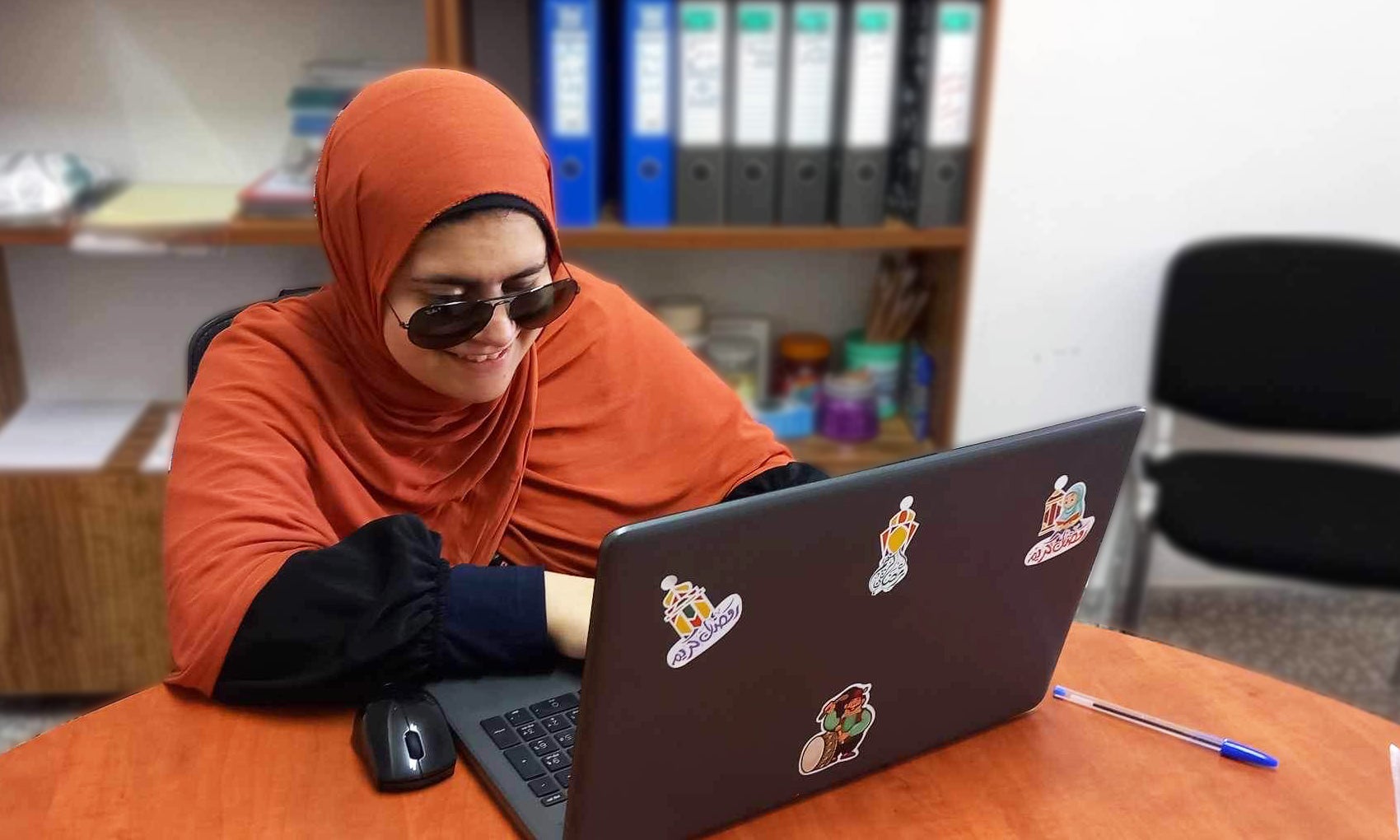In the Words of Ameera AbuArqoub “People with Disabilities Can Be Full Members of Society When They Match Their Skills with Market Needs.”
Date:

Ameera, 24, was born with a vision impairment. She lives in Ramallah with her siblings and parents. She has a degree in English Language and Literature and is currently pursuing a master’s degree in Community Development. Ameera also works at EducAid, an international non-profit organization, where she helps people with disabilities overcome learning and employment challenges. Ameera is part of UN Women’s Youth Gender Innovation Agora, a consultative platform for regular dialogue with Palestinian youth. Established by UN Women Palestine Office in 2020, the forum is made up of civil society professionals, young activists, and advocacy and social media influencers to support youth representatives in developing innovative gender equality solutions and engaging with a broader range of stakeholders. The Youth Gender Innovation Agora members provide expertise on youth and gender issues, design innovative solutions and campaigns, encourage the mobilization of young people and facilitate the dissemination of information to networks and organizations around the region.
“Growing up with vision impairment, I faced many difficulties. But learning was the most difficult challenge. My school did not have braille books, so I had to rely on my mother to read me books.
Unable to see, it was difficult for me to learn words. For example, it was difficult to learn animals’ names because I could not picture them. No matter how hard my parents and teachers tried, there was a gap between what they described and the image in my mind.
At school, challenges abound. But the English classes stood out as easier and more enjoyable than the rest. I received a lot of support from my English teachers and native-English speakers who used to come to my school to volunteer. Instead of relying on traditional methods that rarely take into account students with disability, they used music, drama and games to teach English. This method allowed all the children in my class, including those with disabilities, to learn together. It made me realize the importance of integrating people with disabilities with other students instead of isolating them in specialized schools. It takes disability-responsive curricula and teachers to provide inclusive education that leaves no one behind.
I enjoyed my English classes so much that I decided to pursue a bachelor’s degree in English Language and Literature and become a teacher.
At university, I met many students with disabilities; some had vision impairment while others restricted mobility or Autism. Some of the challenges they faced were like mine, but others were even harder. Girls with disabilities often faced even more challenges than male students, and were doubly discriminated against, putting them at a greater risk of emotional, physical, and sexual violence. Disability, gender, and discrimination are inextricably interlinked. Women with disabilities often confront additional gender-based disadvantages that push them to the extreme margins of society, resulting in lower economic and social status as well as civic and political participation.
Disability rights organizations rarely pay adequate attention to gender dimensions. Over the years, I have come to realize that training and seminars designed for people with disabilities are overly focused on raising awareness about their rights according to international conventions and norms. While important, knowing one’s rights is not enough to live a productive life with disability. To really help people with disabilities, we need to help them build their capacities and skills so they can be part of social and economic fabrics.
That’s why along with two friends, one of them with a vision impairment, we launched the initiative “indimaj” or integration. The initiative aims at identifying skills that people with disabilities, particularly women, already have or providing them with new ones to match the labour market’s needs. For example, depending on their abilities, they can learn a foreign language or acquire computer skills.
My initiative helped me get a job with “EducAid,” an international non-profit organization where I have one-on-one sessions with people with disabilities, mostly women and mothers of children with Autism and Down Syndrome. Through my work with them, I realized how the pre-assumptions and prejudices that some employers have prevent people with disabilities, particularly women, from taking on jobs they can perform, depriving them of the opportunity to lead a productive life.
We still have a long way to go until society fully integrates people with disabilities. One way to get there faster is by better matching their skills with market needs.”